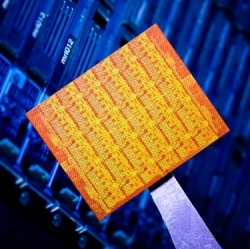
Scientists at Hebrew University of Jerusalem and Weizmann Institute of Science have developed a simple magnetization technology that eliminates the need for permanent magnets in memory devices and allows for fabricating inexpensive, silicon-compatible, high-density, universal memory-on-chip devices.
Current memory devices have significant drawbacks: dynamic RAM memory has to be refreshed periodically, static RAM data is lost when the power is off, flash memory lacks speed, and all are are reaching limits of miniaturization.
In an paper published in Nature Communications, open access), the scientists describe a new technique, called magnetless spin memory (MSM), which drives a current through chiral material (an abundantly available organic molecule) and selectively transfers electrons to magnetize nanomagnetic layers or nanoparticles.
With this technique, the researchers showed it is possible to create a magnetic-based memory device that does not require a permanent magnet, and which could allow for miniaturization of a memory bit down to a single nanoparticle.
Magnetless spin-memory technology has the potential to overcome the limitations of other magnetic-based memory technologies and could make it possible to create inexpensive, high-density universal memory-on-chip devices that require much less power than existing technologies. Compatible with integrated circuit manufacturing techniques, it could allow for inexpensive, high-density, universal memory-on-chip production, the researchers say.
